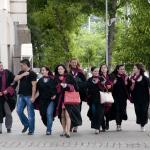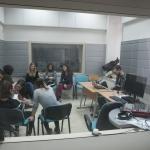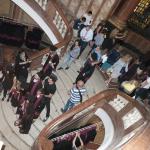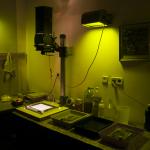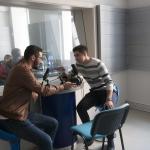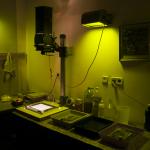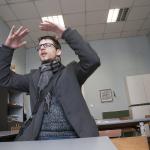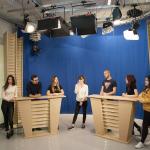Doctoral program "Media and communications"
Description
Professional Field
3.5. Public Communications and Information Sciences
Form of a degree completion
Dissertation defense
The Ph.D. program “Media and Communications” encourages research in communication and media theory and practice. In parallel with the growing difference and the dynamics in the development of media and communications, there is also growth in the interest in obtaining a degree in the field of media and communication sciences. This is a challenge and FJMC is responding to it by creating a third level of high education and preparation of students for a scientific career.
Focus
1.1. Focus of the Ph.D. Program
“Media and Communications” is an integrated scientific specialty in the “Public Communications and Information Sciences” field. The Doctoral Program in “Media and Communications” encourages research in communication and media theory and practice. The high quality of the training is due to the multidisciplinary field and perimeter of specialized training links in the framework of the Faculty of Journalism and Mass Communication of Sofia University “St. Kliment Ohridski” as well as of other faculties of this university, which focuses the efforts of the highly qualified scientific community.
In parallel with the growing diversity and dynamics in the field of media and communications, in the conditions of development of this sector, graduation in the field of media and communication sciences also grows. FJMC responds to this challenge with a third high education degree and preparation for a scientific career that is aimed at the creation of abilities for scientific analysis of the date, through which the media reflect and influence the world, and of the communication subjects and phenomena from different viewpoints – including technological, economic, moral, political and historical.
Ph.D. training in the “Media and Communications” program is coordinated with the scientific field 5.8 Media and Communications of the Fields of Science and Technology (FOS 2007). This allows the synchronization of the Ph.D. program with the world standards and the compliance of the program both with the National Qualification Framework for the Educational and Science Degree “Doctor” and with the European qualification framework for lifetime learning and its actualizations.
1.2. Aim of the Ph.D. Program
• The main aim of the Ph.D. training in “Media and Communications” is to prepare highly qualified specialists with scientific degrees and researchers in the field of media and communication sciences, who adhere to the newest tendencies, technologies, and debates globally. To create highly qualified researchers and scientists, who are prepared to execute the priorities of the National strategy for the development of scientific research in the Republic of Bulgaria for the 2017-2030 period.
• To respond to the transformations of the social functions of science in the context of “the society of knowledge”. In this direction, an important sign of the Ph.D. training is its accordance with the changes in “education – industry” and “science – business” relations and the expectations of the interested parties for new scientific and applied results.
1.3. Tasks of the training in the Ph.D. Program
• Deepening the knowledge linked to the contemporary theoretical and methodological principles of research in the field of communication and media science;
• Mastering and usage of scientific terminology that is typical for social sciences and of the specialized terminology of media and communication research;
• Formation of skills for orientation and analysis of prioritized theoretical and practical problems in the field of media and communications;
• Identification of the challenges for the science of media and communications and search for solutions through team work and academic exchange;
• Motivation and readiness for participation in national and international projects;
• acquisition of competencies and skills for the planning and organization of scientific research and for standalone scientific, applied, and empirical activity;
• Formation of academic skills for standalone teaching activity;
• Building an academic experience and self-esteem when presenting scientific research and popularizing the results at scientific forums and in prestigious scientific journals.
Educational goals
See detailed guidance for the whole process of education of Ph.D. students: Guidance for Ph.D. students in the Ph.D. Program “Media and Communications” at FJMC
Ph.D. courses for the 2021/2022 academic year
Courses and seminars, which are offered to Ph.D. students at the Ph.D. Program of “Media and Communications”, are aimed to prepare them in the spirit of all of the newest achievements of the scientific specialty.
Ph.D. courses for the 2021/2022 academic year
Curricula
Individual curricula are based on the compulsory form for Sofia University. Paperwork consists of:
Application № 1 - Curriculum
Application № 2
Individual curriculum for the full educational period (accompanied with annotation and detailed work plan of the text of the dissertation, which is prepared by the Ph.D. student in a free form)
Individual curriculum for the full educational period for Ph.D. students on an individual preparation (accompanied with annotation and detailed work plan of the text of the dissertation, which is prepared by the Ph.D. student in a free form)
3-month Report (for full-time Ph.D. students)
Annual report
Generalized 3-year report
Approbation of a dissertation
Dissertations are directed to a public defense after a cautious and in-depth discussion on a Department Council on the basis of two written reviews of habilitated lecturers, who are working in the same scientific field.
Application for Internal Defense
The dissertation’s originality is tested before the text’s preliminary discussion on a Department Council.
Declaration for the originality of a dissertation - sample
Protocol of Dissertation revision
Position of the supervisor based on the Protocol of Dissertation revisions and the Report of similarities from the plagiarism prevention system in Moodle
Public Defense of a Dissertation
Publishing of Dissertations
With the Ph.D. student’s agreement, the defended dissertation could be published in the “Media and Communications” Digital Library in the Digital repository of Sofia University “St. Kliment Ohridski”.
Declaration for a digital access agreement
Aims of the education
4.1. Knowledge
• to have and use specialized and systematic knowledge for critical analysis and for systemizing of new ideas in public communications and information sciences;
• to possess the methods of scientific research in the field of media and communications;
• to have the ability to expand and change the existing knowledge in the field of media and communications and of its interaction with bordering scientific fields;
• to possess the highest knowledge and to do original research in a certain field of the scientific area “Media and Communications”.
4.2. Skills
• to find, extract, arrange, synthesize and assess the necessary information from different sources no matter whether they are detailed or scarce;
• to be flexible to the dynamic and complex scientific and communication medium and to be able to use big data and algorithms for communication;
• to have the skills to solve and overcome critical problems in the field of research and/ or innovations, to approve standard models and approaches, to improve the standard models and approaches, to develop innovative decisions through combination of different original strategies and technologies, to manage the unsuccessful tries and to go forward;
• to have an international reflex and skills for inclusion in intercultural scientific projects;
• to have a sustainable attitude for whole life learning.
4.3. Competencies
Independence and responsibility
• to create and interpret new knowledge through their own research in certain disciplines of the scientific specialty “Media and Communications”;
• through the acquired new knowledge to demonstrate skills for broadening the reach of the known scientific disciplines and to estimate the necessity of current publications;
• to have the ability to self-assessment of the achievements of the research work;
• to have skills for composing, projecting, conducting, and adapting a contemporary research process with scientific stability.
Learning competencies
• to show capacity for systematic acquisition and understanding of a considerable quantity of knowledge from the most contemporary scientific achievements or from the field of professional practice.
Communicative and social competencies
• to demonstrate general abilities for conceptualizing, projecting, and conducting projects for generation of new knowledge, application, or understanding of the newest achievements and to adapt the project design to unpredicted circumstances.
Professional competencies
• detailed understanding of techniques that are applied to scientific research and to complex academic research;
• to have the ability to continue the research in the scientific field of media and communication on more complex levels and to contribute to the development of new techniques, ideas, or approaches.
Scientific and educational profile
4.1. Knowledge
• to have and use specialized and systematized knowledge for critical analysis and for the synthesis of new ideas in public communications and information sciences;
• to possess the methods of the scientific research in the field of media and communications;
• to have the ability for broadening and change the existing knowledge in the field of media and communications and of its interaction with bordering scientific fields;
• to have the highest knowledge and to do original research in a certain discipline of the scientific program “Media and Communications”.
4.2. Skills
• to find, extract, order, synthesize and assess the necessary information from different sources – no matter whether they are detailed or scarce.
• to be flexible according to the dynamic and complex scientific and communication medium and to be able to use big data and algorithms for communication;
• to have the skills to decide and to overcome critical problems in the field of research and/ or innovations, to improve the standard models and approaches, to develop innovative decisions through combination of different original strategies and technologies, to manage the unsuccessful tries and to go forward;
• to obtain an international reflex and skills for inclusion in intercultural scientific projects;
• to have a sustainable attitude for whole life learning.
4.3. Competencies
Independence and responsibility
• to create and to interpret new knowledge through own research in a certain discipline of the scientific field “Media and Communications”;
• through the obtained new knowledge to demonstrate skills for broadening the scope of the known scientific discipline and to assess the necessity of current publications;
• to have the ability for self-assessment of the achievements of the scientific work;
• to have the ability to compose, project, conduct and adapt a contemporary research process with scientific stability.
Learning competencies
• to show a capacity for systematic acquisition and understanding of a significant quantity of knowledge of the most contemporary scientific achievements or of the field of professional practice.
Communicative and social competencies
• to demonstrate general abilities for conceptualizing, projecting, and conducting projects for the generation of new knowledge, applying or understanding of the most modern achievements as well as adapting the project design to unforeseen circumstances;
Professional competencies
• to understand in-detail techniques that are applied for scientific research and complex academic research;
• to have the ability to continue their research in the scientific field of media and communications on more and more complex levels and to add to the development of new techniques, ideas, or approaches.
Realization
Realization
The student, who has obtained the educational and scientific degree “Doctor of Media and Communications”, is prepared for independent scientific research and for innovative scientific and pedagogic activity at high education institutions, scientific and research institutions, public and state institutions, etc., in a certain scientific discipline from the field of media and communications. Ph.D. program of “Media and Communications” graduates can:
• participate in different forms of continuing education – post-doctoral programs to increase the professional qualification in the conditions of the growing complexity of the media and communication industry;
• participate in international programs for academic exchange and obtaining experience on the scientific specialty or on the professional field of media and communication;
• to lead scientific projects for junior scientists and post-doctoral students at high education institutions and scientific organizations;
• to take the highest expert positions in the field of media and communications in the government or non-government sector;
• to participate in procedures for academic positions and for procedures for a higher scientific degree in high education institutions and scientific organizations in Bulgaria, in the member states of the European Union, and in the states, which are not a member of the EU.

